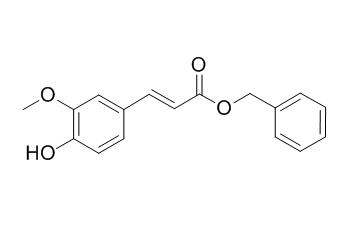Benzyl ferulate
Benzyl ferulate has antimicrobial activity. It also shows good anti-proliferative against three gastro-intestinal cancer cell lines(HCT-116 colon carcinoma, KYSE-30 oesophageal squamous cancer, and NCI-N87 gastric carcinoma).
Inquire / Order:
manager@chemfaces.com
Technical Inquiries:
service@chemfaces.com
Tel:
+86-27-84237783
Fax:
+86-27-84254680
Address:
1 Building, No. 83, CheCheng Rd., Wuhan Economic and Technological Development Zone, Wuhan, Hubei 430056, PRC
Providing storage is as stated on the product vial and the vial is kept tightly sealed, the product can be stored for up to
24 months(2-8C).
Wherever possible, you should prepare and use solutions on the same day. However, if you need to make up stock solutions in advance, we recommend that you store the solution as aliquots in tightly sealed vials at -20C. Generally, these will be useable for up to two weeks. Before use, and prior to opening the vial we recommend that you allow your product to equilibrate to room temperature for at least 1 hour.
Need more advice on solubility, usage and handling? Please email to: service@chemfaces.com
The packaging of the product may have turned upside down during transportation, resulting in the natural compounds adhering to the neck or cap of the vial. take the vial out of its packaging and gently shake to let the compounds fall to the bottom of the vial. for liquid products, centrifuge at 200-500 RPM to gather the liquid at the bottom of the vial. try to avoid loss or contamination during handling.
Adv. Anim. Vet. Sci.2024, 12(4):732-741
Phytomedicine.2015, 22(4):498-503
Phytomedicine.2015, 22(11):1027-36
Key Engineering Materials2022, 931(47-53).
Journal of Phytopathology2021, 169,Issue11-12.
Food and Agriculture Org. Of the UN2019, 151-160
J Pharm Anal.2016, 6(6):363-373
Pharmaceuticals (Basel).2021, 14(6):588.
Biochem Biophys Res Commun.2017, 494(3-4):587-593
Biochem Biophys Res Commun.2019, 518(4):732-738
Related and Featured Products
Fitoterapia. 2015 Oct;106:167-74.
Antiproliferative activity of New Zealand propolis and phenolic compounds vs human colorectal adenocarcinoma cells.[Pubmed:
26347954]
The New Zealand wax-free Bio30™ propolis tincture solids had very high levels of the dihydroflavonoids pinocembrin and pinobanksin-3-O-acetate, and high levels of the dimethylallyl, benzyl and 3-methyl-3-butenyl caffeates relative to CAPE.
METHODS AND RESULTS:
The DLD-1 assays identified strong anti-proliferative activity associated with these components as well as chrysin, galangin and CAPE and a number of lesser known or lower concentration compounds including Benzyl ferulate, benzyl isoferulate, pinostrobin, 5-phenylpenta-2,4-dienoic acid and tectochrysin.
CONCLUSIONS:
The phenolic compounds pinocembrin, pinobanksin-3-O-acetate, tectochrysin, dimethylallyl caffeate, 3-methyl-3-butenyl caffeate, Benzyl ferulate and benzyl isoferulate also showed good broad spectrum activity in anti-proliferative assays against three other gastro-intestinal cancer cell lines; HCT-116 colon carcinoma, KYSE-30 oesophageal squamous cancer, and NCI-N87 gastric carcinoma.
Activity is also observed in anti-inflammatory assays although it appears to be limited to one of the first cytokines in the inflammatory cascade, TNF-α.
Z Naturforsch C. 2000 Jan-Feb;55(1-2):70-5.
Chemical composition and antimicrobial activity of European propolis.[Pubmed:
10739103]
METHODS AND RESULTS:
Three propolis samples from Austria, Germany and France were investigated by GC/MS, where eleven compounds were being new for propolis.
The samples showed some similarities in their qualitative composition. Phenylethyl-trans-caffeate, Benzyl ferulate and galangin were predominant in German propolis. Benzyl caffeate was predominant in French sample. Pinocembrin was predominant in French and Austrian propolis and trans-p-coumaric acid was predominant in all samples. The antimicrobial activity against Staphylococcus aureus; Escherichia coli, and Candida albicans was evaluated.
CONCLUSIONS:
German propolis showed the highest antimicrobial activity against Staphylococcus aureus and Escherichia coli. While Austrian propolis has the highest activity against Candida albicans. French propolis was effective against all pathogens but less than German and Austrian propolis.



